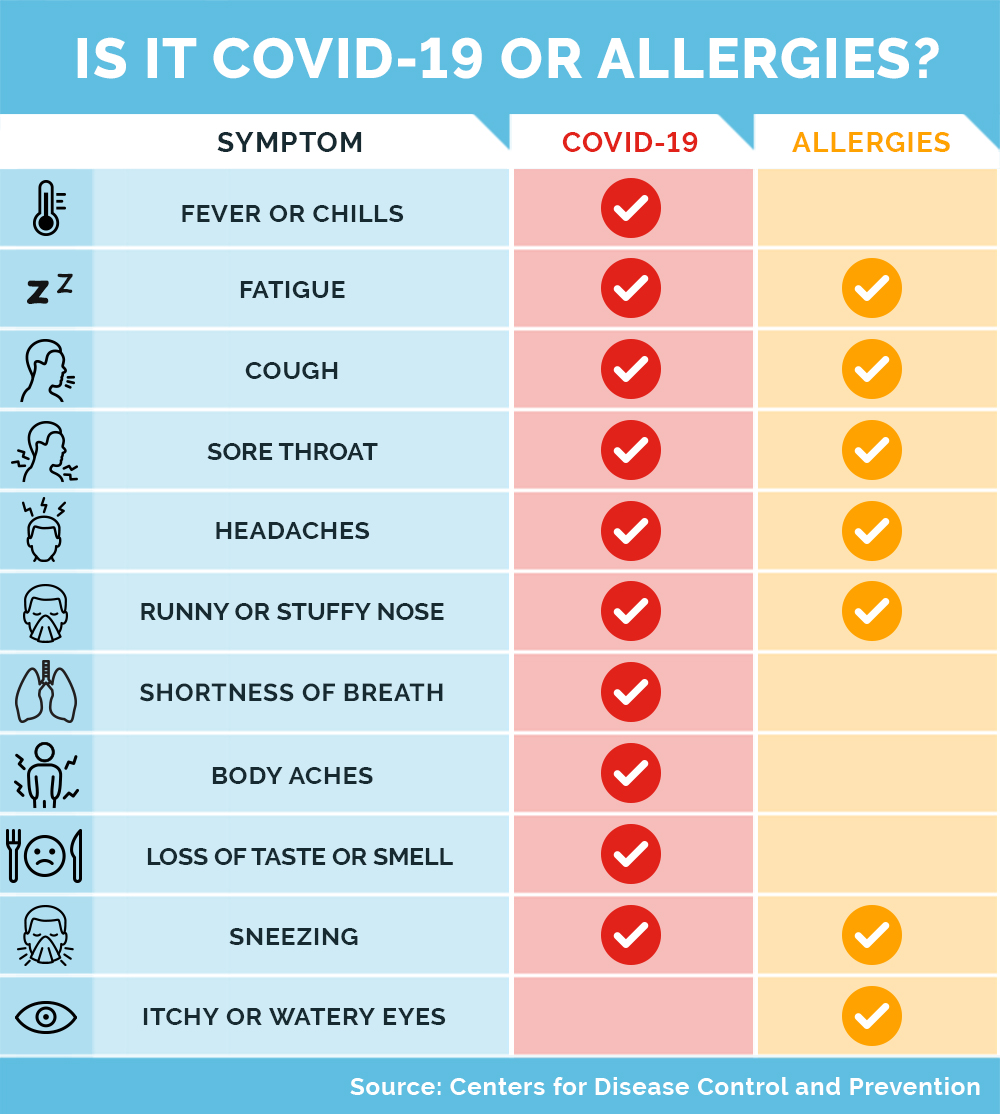Is it COVID, Allergies, a Cold, or the Flu? Here’s How to Tell the Difference
Sniffling and sneezing often come with spring. NewYork-Presbyterian experts explain how to know what’s causing your symptoms.

This spring brings some welcome changes, including warmer weather and blooming flowers. But with pollen counts rising, more people are also coming down with coughs, sore throats, stuffy noses, and itchy eyes. It’s tricky to know if your symptoms are caused by allergies, COVID, the common cold, or the flu.
Here, experts from NewYork-Presbyterian offer insights into each condition, key symptoms that can help you tell the difference between them, and advice on how to treat them.
COVID
What to Know: With new variants always emerging, COVID is still around. While disease is not as severe thanks to vaccines, symptoms are still nagging.
Key Symptoms: Typical symptoms of COVID include headache, sore throat, fever, congestion and runny nose, cough, shortness of breath, muscle aches, severe fatigue, nausea, diarrhea, and a loss of taste and smell, according to the Centers for Disease Control and Prevention (CDC).
Dr. Judy Tung, section chief of Adult Internal Medicine at NewYork-Presbyterian/Weill Cornell Medical Center, says that Omicron presents with similar symptoms as the previous variants, though more people experience upper respiratory symptoms (sore throat and congestion) as opposed to lower respiratory symptoms (cough, shortness of breath), and fewer people seem to lose their senses of taste and smell.
How to Treat It: If you have a mild case, it is important to rest and stay well hydrated, says Dr. Tung. Fever, vomiting, and diarrhea can lead to significant dehydration, which can make you feel worse. Take an over-the-counter fever reducer, such as acetaminophen, every six to eight hours to keep your temperature under 100 degrees. Breathing in the steam during a hot shower can help ease a sore throat and congestion. However, ensure that you are well hydrated and not running a high fever before you do this, advises Dr. Tung. Over-the-counter antidiarrheal medications can help, especially if stools are watery and episodes exceed eight to 10 a day. Always consult your physician to tailor your treatment plan.
If you have a more severe case of COVID-19, or are at risk for disease progression, ask your doctor about whether antiviral pills, intravenous antiviral drugs, and antibody treatments might be helpful options for you.
Allergies
What to Know: As the spring weather changes and trees begin to spread their pollen, you may wonder whether your respiratory symptoms are caused by allergies. Allergies are due to an overreaction of the immune system that causes the body to defend itself against things like pollen, dust mites, or pet dander.
Key Symptoms: The most common symptoms for seasonal allergies are runny nose; sneezing; nasal congestion; watery or itchy eyes; itchy nose, mouth, or throat; fatigue; and sometimes swelling or puffiness around the nose and eyes, says Dr. David Gudis, an assistant attending otolaryngologist at NewYork-Presbyterian/Columbia University Irving Medical Center. Allergies can persist for weeks while pollen counts are high.

Fevers and persistent coughing are uncommon symptoms for routine allergies. If it does trigger a cough, it is usually a dry one. Furthermore, nasal discharge is typically clear and watery when caused by allergies, but thicker or discolored if it’s in response to a virus, says Dr. Gudis.
How to Treat It: If your allergy is due to pollen, being inside may be helpful. If you use an inhaler to treat your allergies, it should be used when needed, whether you are at home or outside. Over-the-counter medications, such as oral antihistamines or nasal steroid sprays, can be used for temporary symptom relief, but ask a doctor about potential side effects if used for extended periods of time
Cold
What to Know: People are accustomed to dealing with runny noses and scratchy throats in the fall and winter, but people can also get the common cold in warm weather, says Dr. Tung. As with COVID-19, viruses that cause a cold can transfer through the air, and through physical contact.
Key Symptoms: The usual symptoms that come with the common cold are sore throat, congestion, runny nose, fever, and body aches. Sinus infections can be associated with the loss of smell and taste, but regular colds typically don’t affect those senses to the degree that can be seen in COVID-19.
How to Treat It: Drink fluids and get plenty of rest, says Dr. Tung. Over-the-counter pain relievers may make you feel better temporarily. When possible, open windows to ensure that shared space is well ventilated to avoid getting other members of the household sick.
Flu
What to Know: The flu, like a cold and COVID, is a viral infection. Due in part to COVID-19 mitigation efforts, flu activity has been relatively low the last few years. The flu usually peaks between December and February, but it can continue into the spring. In fact, for the 2021-22 flu season, the CDC noted an uptick in March after seeing declining cases from mid-December through January.
Key Symptoms: Even though the flu and COVID are caused by different viruses, says Dr. Ting Ting Wong, an attending physician and infectious disease specialist at NewYork-Presbyterian Brooklyn Methodist Hospital, they share a number of common symptoms: fever, fatigue, cough, sore throat, runny nose, body aches, headaches, vomiting, and diarrhea. If you find yourself experiencing any of these symptoms, it’s important to get tested, diagnose your illness, and begin treatment as soon as possible.
How to Treat It: The gold standard for treating the flu is an antiviral drug that your doctor might prescribe; it helps to lessen the severity of symptoms and shorten duration of the illness. But the best way to protect yourself is to get a flu shot every year before flu season begins, and as with all illnesses, to take care of your immune system by eating a healthy, balanced diet, exercising regularly, and getting enough sleep.
